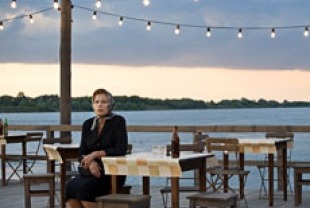The spiritual writer Stephen Levine has recommended that we create spaces in our culture where people can feel safe enough to freely express their grief, sadness, and loss. Sometimes movies do that for us. That is certainly true of Polish filmmaker Andrzej Wajda's Sweet Rush. It is loosely based on a novella by Jaroslaw Iwaszkiewicz. In a self-scripted monologue, actress Krystyna Janda shares her feelings surrounding the death of her husband who died of an illness. This exercise in grieving serves as a counterpoint to a drama involving a middle-aged woman in a small Polish town who is trying to escape from the prison of sadness over the death of her two sons in the Warsaw Uprising during World War II. She has kept their room intact for years.
Marta (Krystyna Janda) is the wife of a physician (Jan Englert) with a private practice. Although he still loves his emotional wife, he is troubled by her inability to let go of their two deceased sons. Marta comes to him for an examination complaining of pain and weight loss. He is stunned to learn that she is terminally ill and has only a short time to live. Even more shocking is his decision not to tell her about her condition.
Perhaps sensing that life is slipping away from her, at an outdoor gathering, Marta flirts with Bogus (Pawel Szajda), a handsome and carefree young man. They meet again and talk, and she offers to serve as a mentor for him. Bogus has a pretty girlfriend (Julia Pietrucha) who studies at the university and wants him to advance his education. But he is happy with his job at the waterworks. Is Marta's attraction to him sexual or is it a means of reliving a relationship with her sons that never was able to bloom? It is probably a little bit of both.
Sweet Rush is carried by the emotionally rich performance of Krystyna who anchors this exploration of grief and the many different ways people try to handle the loss of their loved ones. In his book Making Loss Matter: Creating Meaning in Difficult Times, David Wolpe writes:
"No awake spirit can move through this world without enduring a broken heart. There is nothing real that makes life painless. Accepting the pain of living, knowing one's heart will — and should — be broken, is the beginning of wisdom."
Screened at the 47th New York Film Festival, October 2009

